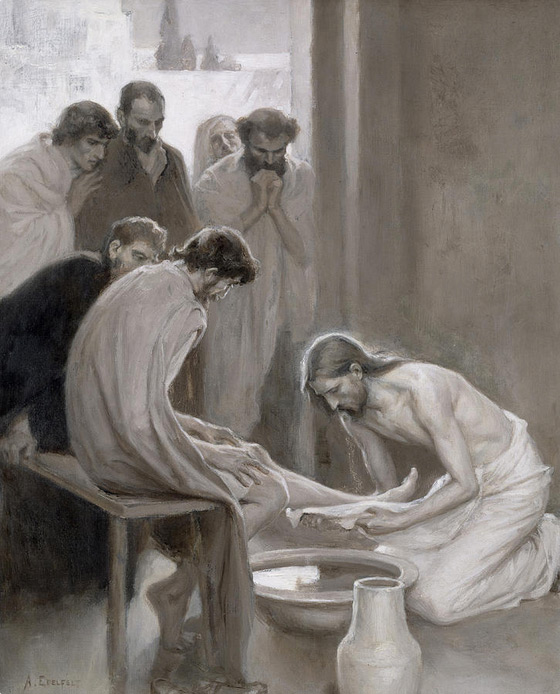
The darkness of Lent grows brighter as Holy Week dawns. The Triduum, or three days of Holy Thursday, Good Friday and Holy Saturday, showcase many rare liturgical actions.
One example is the Washing of Feet at the Mass of the Lord’s Supper on Holy Thursday. Inspired by the texts of John 13, where at the Last Supper Jesus washes the feet of the 12 saying, “I have given you a model to follow, so that as I have done for you, you should also do.” The Mandatum, or commission, has been a liturgical rite since the earliest Christian centuries.
Washing an individual’s feet was a necessary custom in the ancient world. Those in the near east wore only open sandals and washing a guest’s feet upon entry into a dwelling was a refreshing act of hospitality, like offering water today.
The Scriptures are replete with references to washing feet. From Abraham’s Godly encounter in Genesis 18 to the sinful woman who bathed Christ’s feet with her tears in Luke 7, Jesus’ action at the Last Supper is not without historical contextual precedent.
It was common to wash the feet of catechumens before baptism in the early Church. Since baptism and reconciliation were celebrated on Holy Thursday, it became known as “Maundy Thursday” from “Mandatum.”
By the 12th century, the pope would wash the feet of 12 deacons on Holy Thursday afternoon and, after his evening meal, 13 poor men. Bishops would wash the feet of either 13 poor men, or 13 priests.
Pope Pius XII inserted the Mandatum into the evening Holy Thursday Mass in 1955 and by 1962 St. John XXIII permitted the participation of 12 selected men since not every parish would have 12 clergymen available. By 1970, the number 12 was no longer specified, but reference was made to “men.”
In the years since, many pastors have included females in the Mandatum. Recently, Pope Francis made this action normative referring to “those chosen from the people of God.” This would seem to limit the Washing of Feet to the baptized, although Pope Francis has washed the feet of Muslims since becoming Bishop of Rome.
The purpose of the rite is to commemorate the Lord’s injunction to charity and that can be expressed in multiple ways. So the Mandatum remains optional.
In a time when we vote just to elect a minority, or fill seats just to have equal gender representation despite qualification, any “chosen” for the Mandatum will exclude some. Perhaps if such contention will arise, pastors do well to live the injunction to the fraternal charity of Jesus solely by standing in the Person of Christ at the altar to feed His people.
Celebration of the ultimate act of charity whereby the Lord’s body and blood is made present on the a ltar washes our eternal souls again and again. With aging congregations and wet-floor litigation possible, the mandate to “do this in memory of Me” remains more eloquent than washing sock fuzz off of feet.
